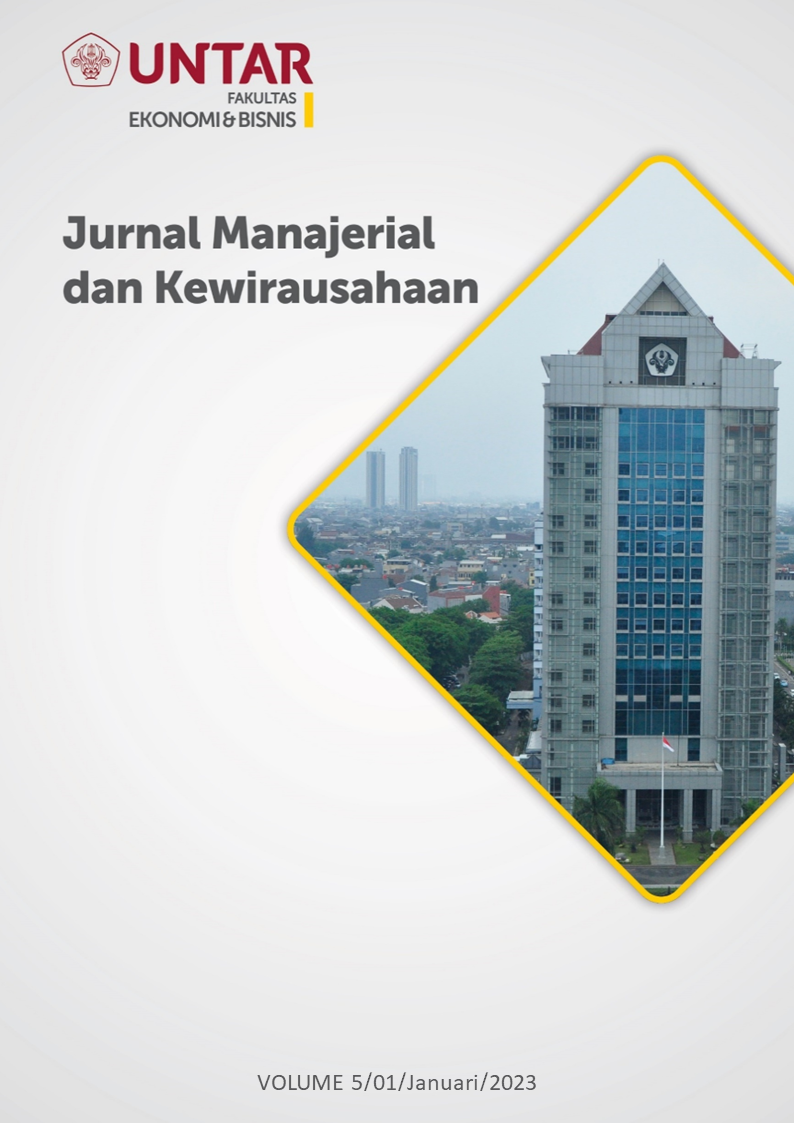Pengaruh Leadership dan Job Satisfaction terhadap Turnover Intention (Commitment sebagai Variabel Mediasi) pada PT XYZ
Main Article Content
Abstract
Penelitian ini bertujuan untuk mengetahui pengaruh antara leadership dan job satisfaction terhadap turnover intention dengan commitment sebagai variabel mediasi pada karyawan PT XYZ. Alasan dipilihnya topik ini adalah karena studi mengenai berkembangnya perusahaan jasa yang mengakibatkan adanya persaingan bisnis yang ketat di bidang pelayanan terhadap pelanggan sangat populer dalam dekade ini. Penelitian ini merupakan penelitian deskriptif kuantitatif dengan jumlah total sample 130 orang. Teknik sampling yang digunakan adalah purposive sampling dengan karakteristik responden karyawan tetap di PT XYZ. Metode penelitian yang digunakan adalah Structural Equation Modeling (SEM) dengan bantuan program Smart PLS 4.0. Hasil penelitian menunjukan bahwa leadership dan job satisfaction memiliki pengaruh yang signifikan terhadap commitment. Namun tidak memiliki pengaruh yang signifikan terhadap turnover intention. Sedangkan commitment sebagai variabel mediasi memiliki pengaruh yang signifikan terhadap turnover intention. Hasil penelitian ini dapat menjadi pertimbangan bagi perusahaan untuk mengembangkan kepemimpinan dan kepuasan kerja karyawan untuk mengurangi terjadinya turnover intention. Saran yang dapat diberikan berdasarkan hasil penelitian ini adalah perusahaan perlu mengevaluasi kembali terhadap faktor yang membuat kinerja karyawan menurun yang akan berdampak pada terjadinya turnover intention, hal ini dapat diperhatikan melalui leadership, job satisfaction dan commitment karena ketiga variabel tersebut memiliki pengaruh yang signifikan bagi perusahaan.
This study aims to determine the effect of leadership and job satisfaction on turnover intention with commitment as a mediating variable for employees of PT XYZ. The reason for choosing this topic is because studies on the development of service companies which result in intense business competition in the field of customer service are very popular in this decade. This research is a quantitative descriptive study with a total sample of 130 people. The sampling technique used was purposive sampling with the characteristics of the respondents being permanent employees at PT XYZ. The research method used is Structural Equation Modeling (SEM) with the help of the Smart PLS 4.0 program. The results of the study show that leadership and job satisfaction have a significant effect on commitment. However, it does not have a significant effect on turnover intention. Meanwhile, commitment as a mediating variable has a significant influence on turnover intention. The results of this study can be a consideration for companies to develop leadership and employee job satisfaction to reduce turnover intention. The advice that can be given based on the results of this study is that companies need to re-evaluate the factors that make employee performance decrease which will have an impact on turnover intention, this can be considered through leadership, job satisfaction and commitment because these three variables have a significant influence on the company.
Article Details
Section

This work is licensed under a Creative Commons Attribution-NonCommercial-ShareAlike 4.0 International License.
This work is licensed under a Jurnal Muara Ilmu Ekonomi dan Bisnis Creative Commons Attribution-ShareAlike 4.0 International License.,/p>
References
Eliyana, A., Ma’arif, S., & Muzakki. (2019). job satisfaction and organizational commitment effect in the transformational leadership towards employee performance. European Research on Management and Business Economics, 25(3), 144–150. https://doi.org/10.1016/j.iedeen.2019.05.001
French, K. A., Allen, T. D., Miller, M. H., Kim, E. S., & Centeno, G. (2020). Faculty time allocation in relation to work-family balance, job satisfaction, commitment, and turnover intentions. Journal of Vocational Behavior, 120, 103443. https://doi.org/10.1016/j.jvb.2020.103443
Hair, J. F., Black, W. C., Anderson, R. E., & Babin, B. J. (2018), Multivariate Data Analysis, 8th ed., Cengage Learning EMEA, London.
Huang, S., Chen, Z., Liu, H., & Zhou, L. (2017). job satisfaction and turnover intention in China. Chinese Management Studies, 11(4), 689–706. https://doi.org/10.1108/cms-12-2016-0263
Khaola, P. P., & Musiiwa, D. (2021). Bolstering innovative work behaviours through leadership, affective commitment and organisational justice: a three-way interaction analysis. International Journal of Innovation Science, 13(5), 610–626. https://doi.org/10.1108/ijis-10-2020-0205
Manoppo, V. P. (2020). Transformational leadership as a factor that decreases turnover intention: a mediation of work stress and organizational citizenship behavior. The TQM Journal, 32(6), 1395–1412. https://doi.org/10.1108/tqm-05-2020-0097
Rai, G. D., & Verma, S. (2022). Quality of work life, fear of COVID-19, job satisfaction, and commitment: a moderated mediation model. International Journal of Productivity and Performance Management. https://doi.org/10.1108/ijppm-10-2021-0578
Tnay, E., Othman, A. E. A., Siong, H. C., & Lim, S. L. O. (2013). The Influences of job satisfaction and Organizational commitment on turnover intention. Procedia - Social and Behavioral Sciences, 97, 201–208. https://doi.org/10.1016/j.sbspro.2013.10.223
Yanuar, Y., Lego, Y., & Masman, R. R. (2019). Job Performance and Government Banks: Evidence from Indonesia. International Journal of Innovation, Creativity and Change, 6(11), 197-212.

